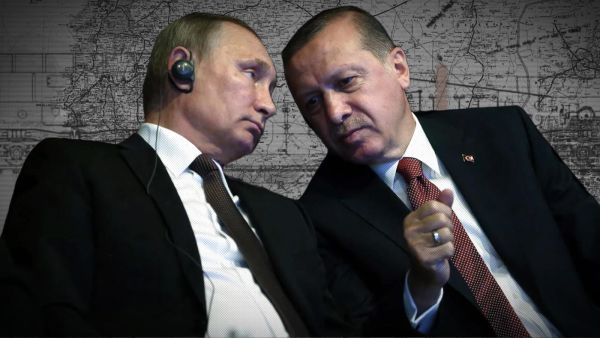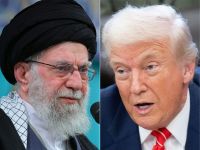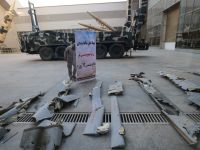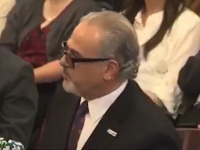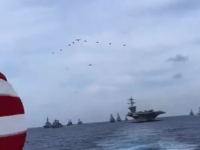The ongoing battle in Idlib, between an exhausted Syrian army and a determined yet comparatively under-resourced set of opposition and jihadi groups, is stalling.
Neither side has gained any considerable ground, but nearly 2,000 people have died since the regime-led offensive began in early May. For every regime advance into a strategic town, a counterattack pushes them back while a counter-offensive diverts thinly stretched troops to a different part of the frontline.
{"preview_thumbnail":"https://cdn.flowplayer.com/6684a05f-6468-4ecd-87d5-a748773282a3/i/v-i-2…","video_id":"2ff2d9ab-8e13-4988-9ab6-0fee3126c79a","player_id":"8ca46225-42a2-4245-9c20-7850ae937431","provider":"flowplayer","video":"Trump Kicks off Contest For The 2020 White House"}
But what’s happening behind the closed doors of Russian, Turkish and Iranian diplomatic offices could be determining the outcome of the battle.
While regime forces and Turkey-backed rebels fight each other, Turkey is providing arms to the rebels and may be using the battle to force Syria back to the negotiating table for a ceasefire. Russia, meanwhile, may be using the conflict to solidify its influence over the Assad regime and pressure Turkey to follow through with its purchase of the controversial missile defense system, the S-400, experts tell Al Bawaba.
Russia, meanwhile, may be using the conflict to solidify its influence over the Assad regime and pressure Turkey to follow through with its purchase of the controversial missile defense system, the S-400, experts tell Al Bawaba.
The battle in Idlib and Northern Hama is just as much about subtle geopolitical plays by Russia and Turkey as it is a physical conflict over strategic towns and routes.
The Ground Offensive
A bomb strikes rebel-held town in Idlib, Syria (AFP/FILE)
Following months of intense shelling by Syrian regime and Russian warplanes, the government launched a ground offensive ostensibly to recapture the last bastion of rebel activity in Syria; Idlib. Almost immediately, the advancing forces were stopped and forced onto the defensive from rebel and jihadi counter-pushes.
“The Syrian Army is tired and you have only few corps able to launch offensive, like the Tiger force from the 4th Corps,” says Fabrice Balanche, a professor Université Lyon 2 and fellow at the Washington Institute for Near East Policy. The Syrian regime’s ground troop reserves have dwindled steadily since the beginning of the war.
“The Syrian Army is tired and you have only few corps able to launch offensive, like the Tiger force from the 4th Corps”
For most major offensives, the Syrian government has had to rely on a combination of Iranian-linked ground troops, local militias aligned with the regime and intense Russian air support. The Iranian-linked militias have been notably absent from the assault, helping explain why it is stalling.
Fighters from Syria’s 5th Division have also been seen in some recent battles. According to Nick Grinstead, an independent security consultant and risk analyst focused on Syria, the 5th Division “was formed by Russia several years ago as a formal structure to incorporate former rebel and Islamist fighters back into the regime's fighting force.”
Although Hayat Tahrir al-Sham (HTS), an umbrella jihadi group, controls most of Idlib, a loose coalition of Turkish-backed forces have also been active in the campaign.
To support them, Turkey has sent arms shipments of armored vehicles, Grad rocket launchers, anti-tank guided missiles and TOW missiles to the forces aligned more closely with them, which were subsequently used to push regime troops back from their early gains. Additionally, dozens of Turkish commandos were sent into the area where the observation post was bombed to reinforce it.
Turkey has sent arms shipments of armored vehicles, Grad rocket launchers, anti-tank guided missiles and TOW missiles to the forces aligned more closely with them
After regime mortars shelled a Turkish military observation post on June 13 in what Turkish officials called a “deliberate” attack, Turkish artillery sent a counter-volley towards regime troops; a major escalation since Turkey intervened in the Syrian Civil War.
As it stands now, neither side appears capable of delivering a decisive blow to the other. But while momentum stalls on the battlefield, it gathers in Turkey and Russia.
The Subtle Diplomatic Game
Putin and Erdogan (AFP/FILE)
Both Russia and Turkey appear to be using the Idlib campaign to achieve a set of political ends in and out of Syria.
Turkey, dead-set on maintaining a sphere of influence in northwestern Syria, is doing all it can to bring Assad and Putin back to the negotiating table for a ceasefire.
“Turkey is walking a fine line between making the offensive more costly for the regime, and thus extending it, and seeking a halt and a return to the ceasefire,” Nick Grinstead tells Al Bawaba.
“It is doing so because it does not want millions of refugees, many of whom have been displaced multiple times, to rush towards its border as a regime offensive rolls on. So it is looking for ways to halt the offensive while not extending it indefinitely,” he adds.
Turkey initially took in over 3.5 million Syrian refugees, but it has since closed its border with Syria to prevent further intake. If the battle of Idlib were to escalate and the rebels rapidly lost ground to advancing regime forces, Turkey would be faced with up to 3 million Syrians currently trapped in Idlib, desperately trying to enter the country.
“Turkey is walking a fine line between making the offensive more costly for the regime, and thus extending it, and seeking a halt and a return to the ceasefire."
Domestically, Turkey’s President Recep Erdogan is facing a crisis in Turkey’s elections.
His ruling party, the AKP, have gradually lost ground and face a potentially damaging mayoral election recount. In March, Istanbul voted the AKP out from its mayorship, but the party has contested the election and ordered a recount. If Erdogan cannot contain the situation in Idlib, his AKP party will likely fall even further.
If Erdogan cannot contain the situation in Idlib, his AKP party will likely fall even further.
Because of this, Turkey is looking to control the offensive as much as possible, dragging out the fighting to deplete the Syrian forces even further without inviting an all-out assault on the rebel-held territory. Erdogan is likely hoping these moves can pressure Syria to respect the terms of the demilitarization agreement signed by his government with Russia.
While Erdogan reacts defensively to the campaign, Russia views it as an opportunity to make gains in two key arenas: with a vulnerable Erdogan and with Assad.
In Syria, Russia has been quietly competing with Iran for post-war influence over the Syrian government and economy. According to Grinstead, “Russia has been able to put pressure behind the scenes to keep as many pro-Iranian militias away from the Idlib frontlines as possible.”
In Syria, Russia has been quietly competing with Iran for post-war influence over the Syrian government and economy. According to Grinstead, “Russia has been able to put pressure behind the scenes to keep as many pro-Iranian militias away from the Idlib frontlines as possible.”
By not letting Iranian troops take part in the Idlib campaign, Russia ensures that Iranian groups cannot cement themselves in the re-captured areas. Grinstead also noted that the forces leading the regime’s campaign are mostly pro-Russian rather than pro-Iranian.
More curiously, the precise level of Russia’s support for the regime campaign may rely on something entirely unrelated to the current fighting: a controversial arms purchase by Turkey.
“This offensive on Idlib is still at the beginning and depends on the Russian Turkish deal about S 400, Fabrice Balanche tells Al Bawaba.
In 2017, Turkey a deal with Russia to acquire the Russian-made S-400 missile defense system. The deal has since been mired in intense controversy, because the S-400 cannot be integrated into the NATO-made missile defense infrastructure.
More curiously, the precise level of Russia’s support for the regime campaign may rely on something entirely unrelated to the current fighting: a controversial arms purchase by Turkey.
The U.S. and other NATO allies are worried that Russia could glean sensitive information about their technology by installing the S-400 in Turkey.
More broadly, the purchase signals that Turkey is distancing itself from NATO and the U.S. and beginning to warm to Russia. In response, the U.S. threatened to withhold a massive shipment of F-35 Jets to Turkey and gave Erdogan a July 31st deadline to withdraw from the arms deal with Russia.
According to Balanche, the arms deal gives Russia leverage over Turkey in the Idlib campaign. “If Turkey decide to cancel the deal because of U.S. pressure, I think we will have a large and intense offensive in Idlib with the help of Shia militias. If not, the offensive will be limited.”
According to Balanche, the arms deal gives Russia leverage over Turkey in the Idlib campaign. “If Turkey decide to cancel the deal because of U.S. pressure, I think we will have a large and intense offensive in Idlib with the help of Shia militias. If not, the offensive will be limited.”
In other words, Russia may be keeping the offensive limited in scope to ensure Turkey follows through with the purchase of the weapon. If Turkey backs away from the deal, Russia may ramp up the assault, compel thousands to the border with Turkey and put immense pressure on Erdogan, who currently has a fragile hold on power.
The missile system can then be seen as a way Russia generates power over Turkey.
For Syrians, the human cost of these political maneuvers has already been great.
A funeral for Abdel-Basset al-Sarout, a famous Syrian goalkeeper, in Idlib (AFP/FILE)
Russia has targeted approximately 25 hospitals in opposition-controlled areas. Because some of these hospitals and field clinics were built deep underground, aid workers concluded Russia had to have used bunker buster missiles to target them.
“They dug it in the heart of the mountain. It’s like a cave, but inside it’s like any other hospital,” Dr Zaher Sahloul, the president of MedGlobal told The Independent on a visit to one of the destroyed hospitals. “It was still bombed and went out of service.”
“They are using sophisticated missiles. They are becoming very successful in getting these places out of service. It is happening every day,” he added.
In addition, regime and Russian forces have made extensive use of barrel and cluster bombs, which indiscriminately shower the ground below them with bomblets and shrapnel.
The longer Turkey can drag the offensive on, and the more Russia steps up its aerial support of the regime, the more steep the human toll grows.


